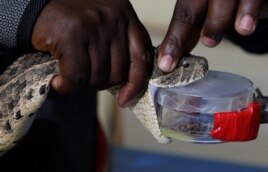16 November, 2019
Kenyan mother Beth Mwende heard her sleeping child cry out, but did not worry after the three-year-old quickly quieted down. The next morning, however, she found her daughter, Mercy, nearly unconscious with two bite marks in the neck.
"I did not know that it was a snake," Mwende said.
Although snakebites are common in her hometown, antivenom medication is difficult to get. Mwende lives about 160 kilometers east of Nairobi, Kenya's capital. So she took her daughter to a traditional healer. He placed stones over the bites to pull out the poison.
Mercy died within hours. She was one of about 700 Kenyans killed by snakebite each year, notes a report in the scientific publication Toxicon.
Experts say the number of deaths is probably higher because snakebites are rarely reported, and few victims make it to a hospital.
The Kenya Snakebite Research and Intervention Centre (KSRIC) is working to change that. Some money for its operations comes from the Liverpool School of Tropical Medicine.
The KSRIC hopes to have East Africa's first antivenom medication on the market within five years. It estimates the cost will be about 30 percent of an imported product, which often sells for about $30.
More than 70,000 people are bitten in East Africa each year. Climate change and deforestation are worsening the problem as snakes get pushed out of natural surroundings into populated areas.
Nearly 100 snakes live at the research center in a forest near Nairobi.

Snake handlers harvest venom from an African puff adder at the Kenya Snakebite Research and intervention centre in Nairobi, Kenya October 22, 2019. (REUTERS/Njeri Mwangi)
Researchers take venom from the snakes and study it before injecting small amounts into other animals, such as sheep. The animals then create antibodies that can be made into antivenom.
"Up to (now), no one has (made) any kind of antivenom in Kenya," said Geoffrey Maranga Kepha, a senior snake handler.
Two effective antivenoms are available in Kenya, from India and Mexico, the center says.
But many ineffective cures are being marketed in countries south of the Sahara desert, says David Williams. He is head of the Australian Venom Research Unit. One of the supposed cures from India "actually increased the death rate," he said.
Vaccine maker Sanofi Pasteur stopped making antivenom medicines for African snakes in 2010 because of low demand. They also said that competition from a less costly maker made it unprofitable.
Sanofi wants to share its knowledge with partners that would agree to manufacture antivenoms, the company told Reuters in a statement.
The center is teaching communities that using antivenom immediately after receiving a snake bite can save lives, said head researcher George Adinoh.
"After seeing how people die in Kenya from snakebites I decided to devote my life to coming up with a rescue measure that will help, or prevent people from dying from snakebites," snake handler Kepha added.
I'm Susan Shand.
The Reuters News Agency reported this story. Susan Shand adapted it for VOA Learning English. George Grow was the editor.
Write to us in the Comments Section or on 51VOA.COM.
________________________________________________________________
Words in This Story
unconscious – adj. senseless; done without one's knowledge
snake – n. an animal that has a long, thin body and no arms or legs
antivenom – n. a medication used against poisonous snake bites
deforestation – n. removing all the trees or plant life from a forest
antibodies – n. a blood protein that works as part of the body's natural defenses to fight bacteria, virus and foreign substances.
senior – adj. older or more experienced
handler – n. a person who deals with or trains animals
devote – v. to decide to do something special for someone or to a thing